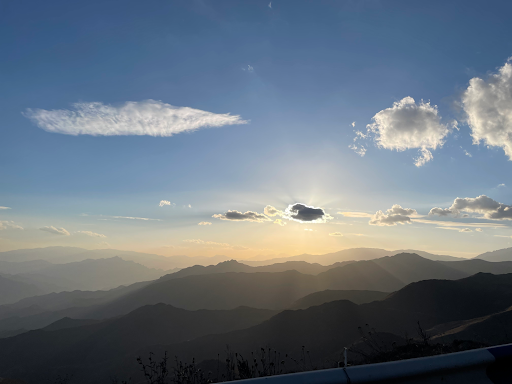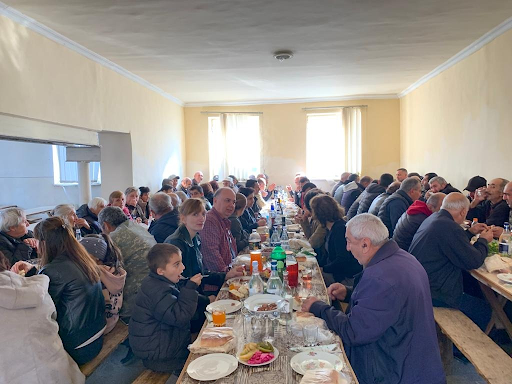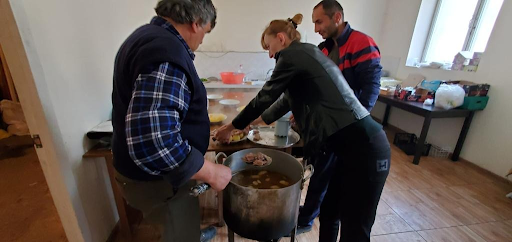After moving to Meghri in June of 2021, it took some time to get acquainted with life here in the south of Armenia. Unlike in the diaspora, where Armenian life is punctuated with community events, the villagers in Syunik rarely gathered together in their villages for anything other than funerals. In order to help change this, last year I decided to organize a Thanksgiving luncheon, originally planning to hold it in the village of Nerkin Hant. This village found itself on the new front lines when Azerbaijan occupied Artsakh’s Kashatagh province. With Azeri posts a mere 800 feet away, the villagers were left without access to their pastures and crop fields that for centuries had been their livelihood. Unfortunately due to a COVID outbreak in the village in mid-November, the luncheon was relocated to my friend’s village of Davit Bek. The last-minute change made it difficult to achieve some of the goals that I had set for the organization of a community event, the most important of which was for the entire community to be present. Whereas in Nerkin Hant, I had communicated for men and women to be present, in Davit Bek it was mostly just men who attended.
Since the September 13th attacks on Armenia, the Azeri army has further advanced on Nerkin Hant. Because of the Armenian army’s failure to guarantee the security of this small village, all the women and children have been relocated to the neighboring village of Shikahogh. Once again, my plans to hold a community event in Nerkin Hant fell through, so I decided to host Thanksgiving in Dzav, the next village just west of Nerkin Hant.

Since the October 2021 closing of the Ghapan-Jagaden highway, the village of Dzav has played a crucial role in the area, as it is home to the only bakery able to supply bread for the six villages cut off by the road closing. It is important to note that volunteer forces had held all the heights in the area securing the highway and the villages, including Nerkin Hant until mid-December of 2020 when the Armenian Ministry of Defense forced the volunteers to retreat and the government handed over those strategic Armenian territories to Azerbaijan.
A few days prior to Thanksgiving this year, I visited the village of Dzav to meet with the Kyooghabed (village head), Seyran, who at the time was helping collect firewood for the bakery. We discussed the details of the luncheon while my friends and I helped load firewood into their truck in the nearby forest. The villagers would bring their turshi (pickles), white beans, oghi and compote (a fruit drink). Potatoes and homemade cheese would be bought locally from the neighboring hamlet of Shishgerd, whose villagers we would also invite. I would purchase the lambs and everything else from my local Meghri area villages, since the people of Dzav no longer have the means to maintain a flock of sheep due to the Azeri presence near their pastures.

We held Thanksgiving on Saturday, as Thursday is a working day in Armenia. A small group of friends from the village of Nrnatsor joined about 100 locals as we enjoyed our meal of khashlama, a local lamb stew. The villagers from Nrnatsor (which means pomegranate valley in Armenian), brought pomegranates as gifts; this was a real treat for the locals as pomegranates do not grow in Dzav. A separate portion of the feast was set aside for a group of young men from the village doing construction work on the roads for the new army posts on the nearby mountain top. They had told me not to include them in the headcount for the luncheon since they would be working. I replied, “Խենթ է՞ք.” (“Are you crazy?”) Not only did we include them in our planning, but we also drove up the unfinished mountain road to deliver their meals.

A majority of the children did not join us as they were “embarrassed to sit with the adults,” but progress was definitely made from last year as many of the village’s women joined in the meal, bringing us closer to the ARS-style community Thanksgiving luncheons that I have grown up with and miss dearly. My parents, local gomideh members and my guests from Nrnatsor also joined in helping set up and clean up, a surprise to the locals but a warm feeling for me, having served Thanksgiving dinner for many years with my fellow AYF Chicago “Ararat” Chapter members. During the dinner, many genats or toasts were given, beginning with a moment of silence for our fallen soldiers, past and recent. One toast particularly stood out for me: an elderly man in the back stood up and exclaimed how their hall for many years has only seen sad events like hokejashes and karasoonks, while happy events like weddings and birthdays were always celebrated in the provincial capital Ghapan. He went on to say that this should be a lesson to his fellow villagers to gather more frequently and rejoice as life always has more room for positivity.
One of my missions in the south of Armenia is to help build community life, much like the one I have grown up with in Chicago. I would like to give a special thank you to my friends and family in the Chicago, Granite City and Los Angeles area communities for helping make this dinner possible. I was able to surpass my fundraising target and will be hosting a second community dinner in Artsakh this Sunday.


Well done, Garin. Best wishes to you and much success to all your projects in Meghri, Artsakh and anywhere else in the Homeland. Abris!
Wow!
Thank you for your beautiful service to them. Great idea and no doubt much work for you and organizers. You should feel so proud.
Bravo Unger Garin! Յաջողութիւն կը ցանկամ զքեզ բոլոր գործերուդ մէջ։
God Bless you Garin. 🙏 You made mane people happy and have given a sense of comfort, togetherness in joy, continued faith and love shared. You remind me of what Jesus spoke to his disciples -to carry on His mission. Abrees🙏